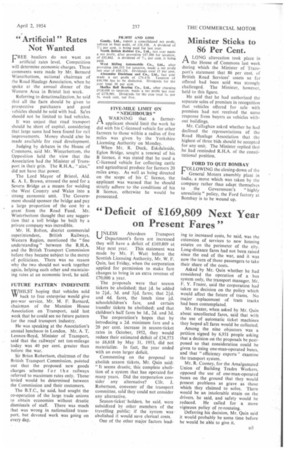"Deficit of £169,809 Next Year on Present Fares"
Page 43

If you've noticed an error in this article please click here to report it so we can fix it.
UNLESS Aberdeen Transport Department's fares are increased they will have a deficit of £169,809 at May next year. This statement was made by Mr. F. Watt before the Scottish Licensing Authority, Mr. W. F. Quin, last Friday, when the corporation applied for permission to make fare changes to bring in an extra revenue of £70,000 a year.
The proposals were that season tickets be abolished; that id. be added to 2id., 3d. and 3id. fares; that 21d. and 4d. fares, the lunch time id. schoolchildren's fare, and certain transfer tickets be abolished; and that Children's half fares be Id., 2d. and 3d.
The corporation's hopes that by introducing a 2d. minimum fare and a 20 per cent. increase in season-ticket rates in October, 1952, they would reduce their estimated deficit of £34,573 to £6,618 by May 31, 1953, did not materialize. In fact, the year ended with an even larger deficit.
Commenting on the proposal to abolish season tickets, Mr. Quin said: "It seems drastic, this complete abolition of a system that has operated for many years. Did the corporation consider any alternative? Cult-. J. Robertson, convener of the transport committee, said they could not consider any alternative.
Season-ticketholders, he said, were subsidized by other members of the travelling public; if the system was abolished it would save clerical costs.
One of the other major factors lead ing to increased costs, he said, was the extension of services to new housing estates on the perimeter of the city. Long-distance fares had not been raised since the end of the war, and it was now the turn of those passengers to take their share of the costs.
Asked by Mr. Quin whether he had considered the operation of a bus system only, the transport manager, Mr. F. Y. Frazer, said the corporation had taken no decision on the policy which would affect the future of trams. No major replacement of tram tracks had been contemplated.
Mr. Frazer, when asked by Mr. Quin about uncollected fares, said that with the use of automatic ticket machines they hoped all fares would be collected.
Among the nine objectors was a petition signed by 6,931 people asking that a decision on the proposals be postponed so that consideration could be given to using one-man-operated buses, and that "efficiency experts" examine the transport system.
Mr. R. Cooney, for the Amalgamated Union of Building Trades Workers, opposed the use of one-man-operated buses on the ground that they would present problems as grave as those which they claimed to solve. There would be an intolerable strain on the drivers, he said, and safety would be reduced. He called for a more vigorous policy of re-routeing.
Deferring his decision, Mr. Quin said it would probably be some time before he would be alale to give it.








































































































